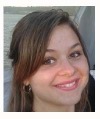 ANNA ROMANDASH, journalist in the middle of the action
ANNA ROMANDASH, journalist in the middle of the action
“The more conflicts there are in the world, the more there are duties for journalists.”
—Anna Romandash
“Writing always came easily to me,” Anna Romandash says. She knew as an eight-year-old that she loved books and wanted to be a writer, so she chose journalism to make writing part of her life’s work as well as to be in the middle of the action and write influential accounts. During November of 2013, Anna landed in the thick of the action.
Ukraine entered turbulent times when the country refused to tolerate the actions of a corrupt government any longer. Anna became one of many who were about to play a significant role in the incipient revolution. President Yanukovich had decided not to sign an Association Agreement with the European Union. Protests flared throughout Ukraine, and the government responded with force against peaceful demonstrators.
Along with her fellow students, Anna joined the events in her home city of Lviv, helping to set up a tent and build a stage in the historic city center. They encouraged others to join them. Only people in the center had access to up-to-the minute information, and journalists had difficulty finding out when organizers planned newsworthy activities. Anna realized the need for a press center to spread the news about what came to be called EuroMaidan (literally Euro square) and the momentous events taking place around it, connecting the city to the national revolution.
Anna started the press center as a Facebook page—which now has 40,000 followers. She called fellow journalists who volunteered to help. The little hub was soon communicating with other media and protesters from other cities, especially in the capital. It was through this press center that citizens of Lviv were informed of the truth about the special forces that brutally attacked protesters in Kiev. They also coordinated information about people who were travelling to or from the capital and needing companions. They remained for five nights in the central tent, despite the bitter cold, though they were warned that they might come under police attack.
Dangerously chilled, Anna and her friends contacted an owner of a nearby restaurant who supported the protesters. He agreed to allow the small media group to work there for two weeks, a huge improvement. They worked twenty-four hours a day, encouraging citizens of Lviv to help their countrymen fight for the better Ukraine.
“It is strange how life turns a person into a leader sometimes,” Anna says.
She and other activists realized that leadership meant setting an example, demonstrating perseverance, hard work, and intense devotion to the cause. “If one truly wants to lead, he or she cannot have second thoughts,” Anna says. She had to patiently maintain absolute confidence that what she was doing would succeed.
Leaders emerge during times of great pressure, but Anna feels that if leadership training had been part of her background, she might have organized things differently and overcome obstacles more quickly. She welcomes HSI and other leadership development programs as a part of essential preparedness.
Lviv protests were the largest outside of Kiev, thanks in part, no doubt to the news center. It was scary and dangerous work, but it was essential, and Anna and her colleagues knew it. For this reason, she doesn’t take any special pride in her role. “It was something I had to be prepared for since I chose to be a journalist and serve people in my country,” a country she was learning to love again after losing hope. “I started looking at my compatriots differently after I realized how much beauty and passion they had.”
She is currently developing a web platform to share reliable information, call for action, give citizens a voice, and fundraise to help refugees. While she is devoted to journalism, Anna doesn’t want to limit herself to one field, because she would also like to work in a field involving international relations for the UN or other organization. What she would especially like is to combine it with her passion for media and communication. “I would love to be a media representative or an ambassador for my country, and I would love to work in a field of human rights and citizen empowerment.” And, of course, she will always write, whatever she decides to do in the future.
